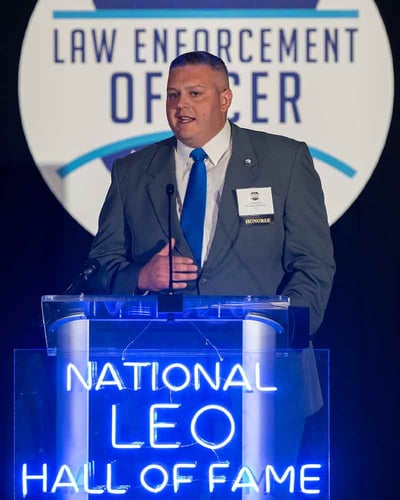Leadership in Police Chief Role Helps Flores Cap Hall of Fame Law Enforcement Career
| Alumni
 For Dr. Jonathan Flores, strong leadership was the difference between a string of successful years in police work and a career that was worthy of his profession’s hall of fame.
For Dr. Jonathan Flores, strong leadership was the difference between a string of successful years in police work and a career that was worthy of his profession’s hall of fame.
Using skills he honed in Trevecca’s Doctorate of Education in leadership degree program, Flores was hired as chief of police in Alton, Texas, in 2018. In that role, over a span of only two years, he elevated the police department and, as a result of his effective leadership, found himself being inducted into the National Law Enforcement Hall of Fame.
“We made the Alton Police Department a Texas Police Chiefs Association Best Practices Recognized Agency,” Flores said. “We were the first in our county to accomplish that, and less than three percent of law enforcement agencies in the state had done it. We also made tremendous strides in executive level leadership training programs for our staff. But I never imagined going into the Hall of Fame.”
He believes his leadership training at Trevecca not only prepared him well for the police chief role, but helped him get the job in the first place. He applied for the position lacking the high-level experience of many of his fellow applicants. In fact, as a major crimes investigator and in other prior positions, he had never worked in any supervisory role.
“I was going up against individuals who were already chiefs. So by all accounts, I probably was not the most attractive choice, but I went in there with a strategic plan,” Flores said. “That was something that I learned in school: how to form strategic plans, how to prepare for the future and translate that into achievable short-term, mid-range and long-term goals.”
In addition to the knowledge he acquired in the Ed.D. program at Trevecca, he says the relationships he developed were just as impactful. He continues to communicate with his cohort members and believes these connections served to make him a stronger leader.
“The Ed.D. helped me network. I believe iron sharpens iron, and I got to network with other individuals from different walks of life that have their own leadership experiences,” Flores said. “You start to develop these relationships and go through this rigorous program that enhances your critical thinking skills. It really helps you unlock portions of yourself that are needed in the workforce.”
Flores had developed into a leader capable of bringing change to his environment and encouraging the men and women under him to excel. Prior to the Hall of Fame induction, he was awarded the 40 under 40 Leadership Award from the International Association of Chiefs of Police.
In his mind, service is at the heart of all good leadership.
“It's all about the people you serve. It is never about you putting your feet up on the desk and people serving you because you're in this position of leadership,” Flores said. “There are going to be opportunities along the way where you receive accolades and you receive praise. But I try to make it a point to always give that back to the people who are doing the heavy lifting.”
Flores' commitment to leadership was clear to those who worked for him, and it was one of his lieutenants who nominated him for the National Law Enforcement Officer Hall of Fame. Finding out about his acceptance was a humbling experience for him and put his decades-long career into perspective.
“I've been in law enforcement for 22 years. I've been a dispatcher, a patrolman, a criminal investigator, a homicide investigator and a police chief,” Flores said. “The award allowed me to reflect on the journey and all the people that helped me and the good examples of leadership that I had in my career along the way.”
Now Flores is moving on from law enforcement after more than two decades of service, and he’s excited to use his leadership skills in a new line of work: he was recently named assistant city manager in his hometown of Pharr, Texas.
